Casualties, force levels and expenditures
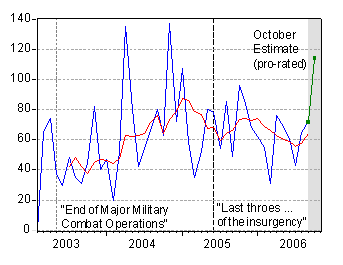
Figure 1: Fatalities in Iraq Theater of Operations, and 6 month trailing moving average, up to end-September, and October estimate is prorated based on figures through 10 October. Source: Iraq Coalition Casualities, accessed 10 October 2006.
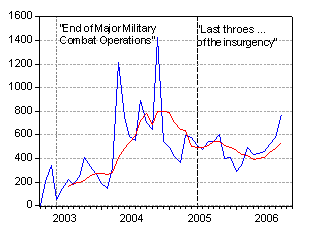
Figure 2: Wounded in Iraq Theater of Operations, and 6 month trailing moving average, up to end-September. Source: Iraq Coalition Casualities, accessed 10 October 2006.
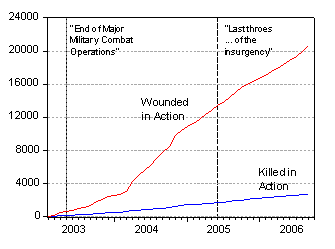
Figure 3: Cumulative fatalities and wounded in Iraq, up to end-September. Source: Iraq Coalition Casualities, accessed 10 October 2006.
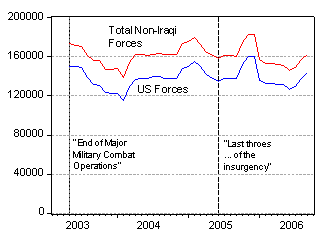
Figure 4: U.S. Forces and Total Coalition Forces (excluding Iraqi) in Iraq, up to end-September. Source: Brookings Saban Center Iraq Index, October 9, 2006 version.
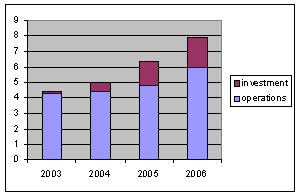 Figure 5: Monthly burn rate for Iraq Theater of Operations, in billions of dollars per month (bdpm), by fiscal year. Source: Amy Belasco, “The Cost of Iraq, Afghanistan, and Other Global
Figure 5: Monthly burn rate for Iraq Theater of Operations, in billions of dollars per month (bdpm), by fiscal year. Source: Amy Belasco, “The Cost of Iraq, Afghanistan, and Other Global
War on Terror Operations Since 9/11,” Congressional Research Service Report RL33110, September 22, 2006, Table 5.
These “burn rates” do not include “reset costs” for replacing worn out and damaged equipment. The CRS report states:
“CBO and Service Estimates of Reset Costs. How large is the likely
reset bill and how might that affect DOD’s baseline budget? Last year, in March 2005, CBO estimated that the backlog of maintenance and replacement costs for warworn equipment was about $13 billion, about the same as the services’ estimates at that time, and that annual repair and replacement costs would run about $8 billion a
year based on the current pace of operations. These CBO estimates, however, do not reflect substantial procurement funding received by DOD in the FY2005 Supplemental, the FY2006 bridge fund, DOD’s baseline or regular budgets, or requested in the FY2006 supplemental. The House Appropriations Committee, for example, estimated that about $8 billion in the FY2006 bridge fund was for replacing
worn equipment.
In its most recent alternative funding path for GWOT, CBO estimates that about $60 billion would be needed through FY2016 assuming a gradual drawdown in deployed forces from about 258,000 in FY2006 to a steady state of 73,000 in FY2010. This estimate does not include the $24 billion in procurement funds appropriated or requested in FY2006, much of which is probably for reset.”
Observation: All indices are rising (except for non-U.S. coalition troops ex. Iraqi; that series is declining).
Technorati Tags: Iraq, reset,
casualties,
defense expenditures, burn rate.
For planning purposes, the Army is gearing up to keep current troop levels in Iraq for another four years, a new indication that conditions there are too unstable to foresee an end to the war.
http://news.yahoo.com/s/ap/20061012/ap_on_go_ca_st_pe/us_iraq;_ylt=ApIqAVjGCE9mOX6Ikcyg.OGs0NUE;_ylu=X3oDMTA3OTB1amhuBHNlYwNtdHM-
Interesting. What is the forecast for total casualties if the coalition forces were totally withdrawn from Iraq, and how much would this number exceed the total number currently forecast with the coalition forces in place?
also take a look at angry bears post
http://haloscan.com/tb/angrybear/116057136656517192
So, no discussion of civilian casualties, now estimated to be about 655,000 in a carefully done study published in Lancet?
Excellent post, particularly with respect to government expenditure per month.
These are the statistics that policy markers and the public should be discussing; not that unsubstantiated study in Lancet (which in recent years has shown a willingness to publish statistically weak but headline-grabbing papers).
RD,
Most commentators have agreed that the Lancet paper has the most scientific methodology of any study yet done on civilian deaths in Iraq. The Iraq Body Count report that the administration favors is based on deaths reported in newspapers. But there are very good reasons why a majority of those killed would not get their deaths reported in newspapers. Lots of families with somebody getting killed in them do not wish to draw attention to themselves for obvious reasons.
So, just what are these other “headline grabbing but statistically weak” studies you are referring to? Lancet is in fact one of the most highly respected medical journals in the world.
Not to start a fight on social science research done within the medical sciences but…
Did you see the confidence interval on that paper? I’m all in favor in doing research when limited data exists, unlike some economists, but this doesn’t seem to be a great case. A death rate as high as that reported in the paper should be accompanied by a much greater refugee flow than that reported.
I think most econometricians would be very critical of much of the work that is done in medical journals. My own work indicates that their public health research (by that I mean their ventures into social science) would be significantly improved by using instrumental variables or 2SLS once and while. Much of their impact analysis is highly flawed due to missing variable bias.
A more general critique of Lancet:
http://www.timesonline.co.uk/article/0,,2-1658807,00.html
Key paragraph:
The signatories, thirty fellows of the Royal Society, two of whom are Nobel laureates, accuse it of favouring ?desperate headline-seeking? over sound science, to the detriment of public health. ?Under the editorship of Richard Horton, the publication of badly conducted and poorly refereed scare stories has had devastating consequences for individual and public health, in the UK and abroad, and carried a high economic cost,? they say.
All indices are rising
I’d kind of question that, personally. Take the first graph, for example. The six month rolling average was falling for half a year, and right now has an uptick– but at the same time is as low as it’s been since the middle of 2003. Several of the indices seem to go in cycles.
The Lancet study suffers partially because it was an interview of households about deaths in their households. It would obviously miss any household which was completely wiped out (or which fled Iraq after one member was killed), a tactic favored by Saddam, who often did kill the relatives (and even whole villages) of enemies.
It also suffers because it included only 14 months of pre-invasion numbers. Go back slightly farther, and you include some slaughters of Marsh Arabs and Shiite Arabs. Go back even farther (pre-No Fly Zone) and you include attacks against Kurds.
It may well be a somewhat decent number for comparing deaths while the No Fly Zone was being patrolled and the Kurds protected, and thus an argument for continuing that policy, but certainly not a fair average for Saddam’s rule in general. (At the same time, the violence now may well have been mirrored upon the next uprising, or when Saddam perished.)
There is every reason to believe that post-hostility RESET costs will be much higher than the CBO believes or the Army leadership will publicly admit. Most of the RESET experience so far is split 90/10 between “home station” and depot. “Home station” repair just brings the equipment up to mission capable condition, but does not address the degradation problem. Equipment that goes to one of the Army’s depots undergoes a more extensive overhaul and in some cases is restored to original equipment manufacturer “zero mileage” standards. That is very expensive. Because of severe equipment shortages the Army retrogrades weapon systems back to the returning unit’s home station. That unit then goes on mandatory leave. Then (mostly) civilians repair the equipment “just good enough” so that it can be handed off to the next GET READY unit, who trains with it and eventually deploys. Equipment shortages mean that the inventory has to be kept in a constant flow. As a result the Army keeps kicking the overhaul can down the road. Eventually this stuff will have to be completely overhauled at a cost much higher than RESET costs to date. And the official Army story is that there is plenty of capacity at the Army’s depots. If you believe that then I have a bridge I’d like to sell you. The median worker at the Army’s overhaul depots is within 6 years of full retirement. Do the math. Capacity constraints are going to increase costs.
As to John Thacker’s speculation about the violence in Iraq…I wonder if he actually knows anyone who goes there on a regular basis? Most of the people in my office come back stunned at how the violence has escalated. The troops in garrison are now depending on a lot of gallows humor songs as a way to deal with it.
RD,
OK, I grant that maybe Lancet has not been as scientific as I thought. However, I am not under the impression that this particular study is one that used regression and needs 2SLS.
John Thacker,
Also a point well taken. So, maybe the total civilian deaths under Saddam are undercounted.
Regarding the numbers in the Lancet study itself, Juan Cole points out that one reason for the discrepancy between federal Health Ministry stats and this study is the inability of the feds to get at data from many local jurisdictions, some of which communication has become completely broken down, including even in Shi’a areas such as Najaf.
Regarding the issue of refugees, some of this may be a matter of abiity. Thus, the Christian population of Iraq is now about half what it was when we invaded. Most of those economically better off people have left. Many others not near a border are not so able to do so easily. (I shall not go on about the irony of Christian Right types supporting this war, given what has happened to the Iraqi Christians… ).
So, let us suppose that the Lancet study is somewhat overdone. Maybe the actual number is near their lower end (420,000, I believe), or maybe it is only a half or even a third. Also, let us suppose that the actual deaths under Saddam were higher by some amount. We are still looking at a situation where in three years, civilian deaths in Iraq are on about the same order of magnitude as civilian deaths under Saddam over a period of time ten times longer. And, saving civilians from death and torture was supposedly one of our main reasons for going in (along with the now discredited “need” to eliminate those nasty WMDs… ).
RD,
Have you read the actual John Hopkins report concerning civilian casualties? Or are you tarring all reports because some in Lancet received criticism?
It seems to me that the Hopkins report, which substantiates the claims of an earlier report, has a bit more meat in its methodology than the source Menzie uses.
Consider the following admission by the statisticians of icasualties.org concerning civilian casualties:
It is not possible for us to verify these numbers and sometimes news accounts vary widely from one news agency to the next. For this reason we rely heavily on information provided by the Reuters News Agency in their Iraq Factbox daily security incidents release.
An interesting methodology. At least the Hopkins’ report had feet on the ground doing the interviewing.
I personally find your cavalier dismissal of the report somewhat irresponsible.
The very least you could do is to acknowledge that the official count has serious flaws. If fact, its methodology is absurd.
I am not sure what we gain from such reports besides some sadistic, voyeuristic pleasure.
Those who believe that Iraq is central to our fight against an enemy who will kill us if we do not kill them first will understand that casualties are sad but necessary and the actual numbers do not matter when it is life or death.
On the other hand those who believe that we are in Iraq for some nefarious reason will criticize the adventure even if there is no body count.
Dick: In any endeavor, attempting to measure progress is important. We have to ask ourselves: What was the past state; The present state; What might be the future state.
The either/or talking points of the neocons and the administration, either you are with us or against us, are dangerous, as they allow imcompetence to be swept under the rug in the name of holding the party line. Sort of like a disfunctional family pretending to be functional, while everyone in the neighborhood knows what is going on.
I will admit: There are exceptions to measuring progress. When my son is running to first base, he’s told to stop looking for the ball. Run.
We are not playing baseball though. In a democracy, the people must understand what is going on. Particularly after years of non-progress. Because our leaders serve us, not vice-versa.
At this point, the unnecessary and incompetently executed endeavor in Iraq appears to be a failure. Sadly, it’s come down to the question of how bad a failure. The neocon either/or talking points haven’t worked so far; there’s no evidence they will suddenly start working.
TR
Could you define success in Iraq and also what results would indicate the neocon talking points were “working”?
Have no fear, my friends.
James Baker (the third, of course) has just fitted the collar on 43 and the leash is soon to be connected.
Frankly, it has amazed me that the “biggest money boys” have permitted this faith-based nut to do this much damage.
Anyway, they used to love him, “but it’s all over now.”
Dick: My point is that the administration–in particular Bush, Cheney, and Rumsfeld–believed that controlling the spin could control the outcome. They “learned” this lesson from Vietnam. Because they believe we “lost” that war due to public sentiment turning negative, not because it was (a) an unwinnable guerrilla insurgency and (b)unnecessary. So the above triad tried hard to control the spin by creating the us versus them, either/or language. It worked for a while, as it quashed any sensible debate. But that was only in the public policy realm. It never worked on the ground. Because the either/or mindset disallows debate that finds problems with the plans. So from a practical, boots-on-the-ground perspective, I’m not convinced the either/or (with us or against us) line from the administration was successful. Instead, it created the path towards fiasco.
As far as success in Iraq, I think what we had with the inspectors in Iraq before the war started could be defined as success. The Kurds controlled their region, Saddam was largely the mayor of Baghdad, and our money and efforts could be focused on Afghanistan and North Korea and Iran. And inspectors were proving that there were no weapons of mass destruction. That was a very successful policy.
Dick,
You are a bit indirect, but it would appear that you at least to some degree take seriously the argument that “Iraq is now the central front in the war on terrorism.” I kind of doubt this myself, but would definitely argue that to the extent it is now true it is entirely a result of our invasion of Iraq. Even Bush now admits there were no working relations between al Qaeda and Saddam’s regime prior to the invasions. Saddam had rejected requests to help them back in the 1990s and was himself trying to capture al Zarqawi, who was an enemy of his regime. There were a few anti-Israeli terrorists based in Baghdad, most importantly Abu Nidal, but no directly anti-US ones.
Anyway, I think those who create awful messes should be held responsible for them. To the extent Bush and crew have made Iraq into a terrorist haven, they should be held responsible for this disaster. This is certainly a problem that affects US combat deaths, US taxpayers, and future US national security, even if one wishes to dismiss hundreds of thousands of dead Iraqi civilians as just a necessary cost on the way to fighting this apparently unnecessary war on a front that did not exist before we created it.
Barkley and TR,
I do not really want to get into a debate on whether removing Saddam and closing the terrorist training camps in Iraq was justified or not, but there is no debate that in their communication Al Qaeda has stated that Iraq is the primary battle field in their war with the west. There is also no debate that the civilian casualties today are overwhelmingly caused by Al Qaeda and Iraqi sectarians not US forces.
Dick — what Al Qaeda training camps in Iraq?
Dick,
You are right that US forces are not directly killing most of the people dying now in Iraq. But you are wrong that al Qaeda or its relatives are significantly doing so either. Most of it now seems to be by a combination of internal inter-sectarian conflicts and remnant secular Baathist Sunnis against the regime, as well as increasingly intra-sectarian conflicts as between various Shi’i militias, both in Baghdad and in the South.
In any case, near none of this would have occurred if we had invaded, and there is little our presence there now can do to stop it.
And I would second spencer’s question: what terrorist training camps under Saddam’s rule???
Dick,
That has to be one of the most amazing pieces of tripe I have ever read: Accusing people of voyeuristic pleasure who call attention massive body counts.
From your point of view, we should just ignore the senseless slaughter.
Dick,
Oh, of course I meant to say that near none of this would have happened if we had NOT invaded…
Thanks for mentioning Iraq, Menzie (no ordinary economist) and not following the WH press releases talking up the improvement in the debt picture.
The terrorist training camps in Iraq under Saddam were primarily at Samarra, Ramadi, and Salman Pak. Saddam used these camps as international training camps. To understand more about these camps read this PBS interview http://www.pbs.org/wgbh/pages/frontline/shows/gunning/interviews/khodada.html
Concerning Al Qaeda in Iraq, do you remember the Jordanian, Abu Musab al-Zarqawi? al-Zarqawi was in Afghanistan when the US invaded. It is believed that he injured his leg in fighting in Afghanistan and he went to Iraq for treatment. He was the leader of most of the opposition in Iraq until he was killed June 7, 2006. Al Qaeda announced that his replacement would be Abu Hamza al-Muhajir. If you believe that Al Qaeda is not active in Iraq you have your head in the sand.
Those now fighting in Iraq had extensive training in Saddam’s terrorist camps and from Al Qaeda operatives such as al-Zarqawi.
Al Qaeda and the those intent on sectarian violence in Iraq are not strong enough to fight a real war so they instead kill innocent Iraqis waiting to buy bread or simply walking the streets.
Like I said I do not want to debate the Iraq conflict, but I encourage you to do some due diligence rather than parroting inaccruate media reports.
Stormy – Could you tell me of what use body counts are other than voyeuristic pleasure? Should we have ended our actions in WWII because of the body count? If we are in a war, body count is not important. Victory is important because the alternative is worse than you can apparently imagine.
Dick: I think you miss the point in equating the battle for Iraq with the global struggle against violent extremism (or GSAVE, my favorite Pentagon acronym). Casualties matter, in so far as as they are costs, and they need to be assessed against benefits. Your argument that the benefits always justify any cost reminds me of the domino theory. I’m still waiting for Thailand and Malaysia and the rest of South East Asia to fall to Communist forces. Perhaps more germane to your arguments, I agree it was important to defeat the Central Powers in World War I, but whether invading at Gallipoli was the most sensible approach seems to be a question that has been decided by historians in the negative. So, should we compound a bad decision by incurring additional costs — of which “body counts” as you term them are a large component?
John Thacker: I am always amazed by the concern for the Iraqi people that is expressed as a motivation for intervention. I am amazed because equal conviction is often lacking for similar intervention in other parts of the world which share similar or even greater human suffering (Rwanda in the past, Sudan right now), but fail to share the critical attribue of petroleum reserves.
Menzi,
The only time we have the luxury of playing with body counts is if we assume that we can’t lose. This is something that concerns me. I believe that most of the people who oppose our struggle against these Fascists are blind to the possibility that we could actually lose and by lose I mean face constant and persistent bombings such as those in Iraq.
If you still don’t understand the threat consider the havoc caused by the Virginia snipers of a few years ago. Now imagine 10-12 such snipers in different states in our country.
I am not sure that people understand the seriousness of this conflict. It is much more than Iraq but right now it is central to the conflict.
Dick,
This will be my last posting on this as this debate has rather gone off the rails from the original intention. However, I may have been responsible for that, for which I apologize to Menzie and his readership of whatever views.
So, in answer to the “what terrorist training camps” you provide this link to an interview on Oct. 14, 2001 by the NYT and played on PBS with Sabah Khodada. This man was a major in the Iraqi army between 1982 and 1992, presumably the period that he discusses regarding the activities at the Salman Pak camp, where he alleged that terrorist training of various sorts was being carried out under the oversight of the Mukhabarat, Iraq intelligence, with a section of the camp that he did not have access to in which foreigners were also trained, mostly supposedly Arabs, Saudis or Yemenis or people “from the Gulf,” mostly. This training included supposedly how to hijack planes. He asserts that he is certain the 9/11 hijackers were trained there, but admits no specific evidence that they were.
So, he admits that he is unaware of any specific al Qaeda presence in this camp, or that of any other organized group, including anybody working with or for al Zarqawi.
The only specific operation he can name that were due to people from this camp was during the first Gulf war when supposedly some of them “penetrated” the Saudi lines to bring back the coordinates for a target for Scud missile in Saudi Arabia. He also mentions links to camps in Lebanon. That is it for any specifics, and the latter hardly counts.
There is then the problem of this man’s credibility and indeed even his knowledge, given that he was not there after 1992, which is about the time that al Qaeda was initially forming. I quote from an “Editor’s Note: November 2005”
“More than two years after the U.S.-led invasion of Iraq, there has been no verification of Khodada’s account of the activities at Salman Pak. In fact, U.S. officials have now concluded that Salman Pak was most likely used to train Iraqi counter-terrorism units in anti-hijacking techniques [which explains the presence of a major airplane at the camp, which Khodada made much of in his interview]. It should also be noted that he and other defectors interviewed for this report were brought to FRONTLINE’s attention by the Iraqi National Congress (INC), a dissident organization that was working to overthrow Saddam Hussein. Since the original broadcast, Khodada has not publicly addressed the questions that have been raised about his account of activities at Salman Pak.”
I would add that the INC was the group led by Ahmed Chalabi, which has since been fingered as having put been responsible for most of the false reports made about the presence of WMDs in Iraq. They are essentially discredited. You should be ashamed of youself, Dick, for putting forward such a worthless piece of garbage of so-called evidence for your exaggerated claims.
I already addressed the issue of al Zarqawi, although you have conveniently ignored it. It is now known that he was an anti-Saddam activist and that Saddam was trying to capture him. That he got his leg fixed in an Iraqi hospital does not disprove this. He could have done so under a false identity.
Also, it is now clear that the al Qaeda elements are the least important elements in the current fighting, way outweighed by both the sectarians and the Saddamist Baathists. And, of course, Khodada did not prove their presence in Iraq, with al Zarqawi’s group barely amounting to anything prior to our invasion. We are back to the point that to the extent al Qaeda does have a strong presence there now, it is because of our invasion.
You have zero support for your claim that those now fighting were trained in camps in Iraq or by al Zarqawi.
Finally we have your bizarre fantasy about “Virginia snipers.” Let me get this straight: are you claiming that if we “lose” in Iraq we will have al Qaeda snipers scattered all over the US? (I remind that the VA snipers, who also did some shooting in MD, were strictly home grown, not al Qaeda guys.) I am not aware that there were any al Qaeda snipers at all prior to our invasion of Iraq, although we did have some bomb and airplane attackds by them.
It would seem that the only way you could make your claim would be if somehow our invasion of Iraq has so strengthened al Qaeda that they would now be able to do all kinds of terrible things they were unable to do previously. I would note that this would coincide to some extent with the conclusion found by the recently leaked NIE that our war in Iraq has stimulated recruitment by al Qaeda. That continues to argue that getting out of Iraq would be the best thing we could do to slow down that recruitment and therefore enhance our national security.
How about using the election as a point of reference, and the bombing of the golden dome? I think it would be more interesting than Cheney’s stupid quote.